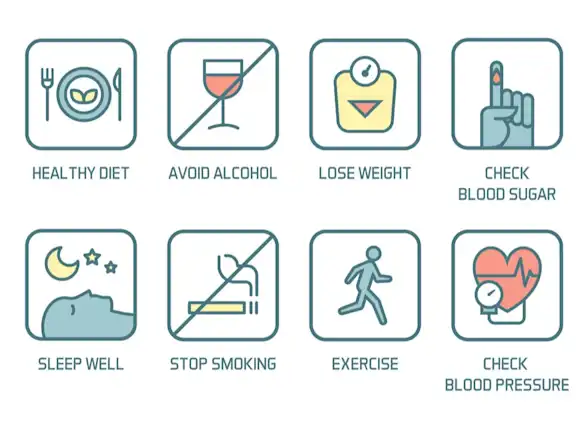Heart Attack Causes and Prevention
80% of premature heart attacks, also known as a myocardial infarction (MI), are preventable, and you can help.
Get insurance benefits, legal documents, and medical records in one place

Helpful Highlights
Heart attack, or acute myocardial infarction (AMI or MI), is a serious condition that occurs when blood flow to part(s) of the heart is cut off and requires immediate treatment.
There are many ways to prevent complications associated with this condition and minimize its long-term effects.
Making diet and lifestyle changes promote recovery after a heart attack, as well as preventing heart attacks from occurring again in the future.
What causes acute myocardial infarction (AMI, or MI)?
Coronary artery disease (CAD), also called simply heart disease, is the primary cause of heart attack.
The coronary arteries are the vessels that wrap around the heart and supply oxygen-rich blood to it. When these arteries become blocked by a blood clot or narrowed by a buildup of plaque, the blood flow to your heart can decrease significantly or stop completely. This can cause a heart attack.
Can my loved one prevent a heart attack?
In general, there are many things your loved one can do that may prevent a heart attack. Some factors that contribute to heart attack risk are beyond their control, like genetics/family history and age. Still, giving their best effort toward reducing risk can postpone a heart attack and reduce the severity, should they have one.
How can they reduce the risk of having a heart attack?
Although we can't alter genetics or age, most of the risk factors are what's called 'modifiable' (can be controlled), and there are many ways you can help your loved one to do so.
Schedule their annual checkup. Make sure they see their primary care provider at least once a year for a checkup or wellness visit. An annual checkup can catch many of the early warning signs of heart disease, including signs that they can't see or feel, like high blood pressure, high or low blood sugar levels, high cholesterol, and more.
Additionally, make sure they keep all their medical appointments, and consider going with them to those appointments, if feasible. Like the annual wellness visit, regular visits with their other healthcare providers can help uncover heart-related issues or other medical problems. Early detection leads to early intervention.
Help them make a grocery list and go with them to shop for makings of a heart-healthy diet.
whole grains
vegetables (fresh or frozen, not canned)
fruits (fresh or frozen, not canned)
lean proteins (chicken, turkey, fish, shellfish, game, 96% lean ground beef, filet tenderloin)
reduced sugar (candy and sugary drinks are the biggest sources)
low or no sodium (achieved by avoiding added salt and processed foods)
avoid processed foods (deli meats, prepackaged meals - whether fresh or frozen, canned foods, and cheese stuffs - Velveeta, Kraft singles, canned or jarred cheeses and dips)
Help them get extended activity (at least 40 minutes) or moderate exercise (at least 20 minutes) several times a week to improve cardiovascular health.
Long walks or bike rides are a great start.
Water aerobics are fun.
Look into the SilverSneakers program.
Help them with tobacco cessation (stopping), especially smoking. Refrain from purchasing tobacco products for them, look into nicotine replacement items instead, and talk with their primary care provider about cessation programs.
Developing a heart-healthy diet and adding activity/exercise will help them maintain a healthy weight, which is essential for cardiovascular health. Talk with their primary care provider about ways to reach this goal, and be sure to review their insurance benefits for nutrition and weight loss programs.
Ensure they are able to manage their existing health conditions. In addition to diet, exercise, and adequate sleep, this includes making sure they use any devices and take medications as prescribed - all of them, on time, every day, and understand how to use any as-needed or rescue meds prescribed. An important thing you can do is to make sure they have an adequate amount of medication (i.e., getting refills).
Encourage them to reduce stress, if this is a factor. Consider techniques such as yoga, tai chi, deep breathing, meditation, floating (pool or lake), and even just "unplugging" from technology.
RESOURCES
American Heart Association (AHA) – Heart Attack
American College of Cardiology – Chest Pain Practice Guidelines
CDC – Heart Attack Symptoms, Risk, & Recovery
Cleveland Clinic – Heart Attack (Myocardial Infarction)
No content in this app, regardless of date, should ever be used as a substitute for direct medical advice from your doctor or other qualified clinician.
Get more support and guidance on insurance benefits, medical records and legal forms.
Helpful brings together your insurance benefits, legal documents, and medical records in one personalized place — so you always know what you have, and never have to search again.

Technology for Health Tasks. Mental Health for the Tough Stuff.
Helpful connects your medical records, insurance, and caregiving tasks automatically. And when you need more than logistics, a therapist is here to guide you.
In-Network and Covered
For Individuals, Couples and Families
HIPAA Compliant, Data Stays Private


Healthcare Tasks Simplified

From syncing records to spotting drug interactions, Helpful does the heavy lifting, turning complex health info into clear tasks and showing you benefits you can actually use, giving you clarity and control over your care.

In-Network Mental Health

Our licensed therapists are here to support you and your loved ones through stress, burnout, and life’s hardest moments, with an inclusive, compassionate approach that works with most insurance plans.

Create Legal Documents

Plan ahead by creating will, trusts, advance directives and more, that ensure your wishes are honored in the event you can’t speak for yourself -with Helpful guiding you every step of the way.